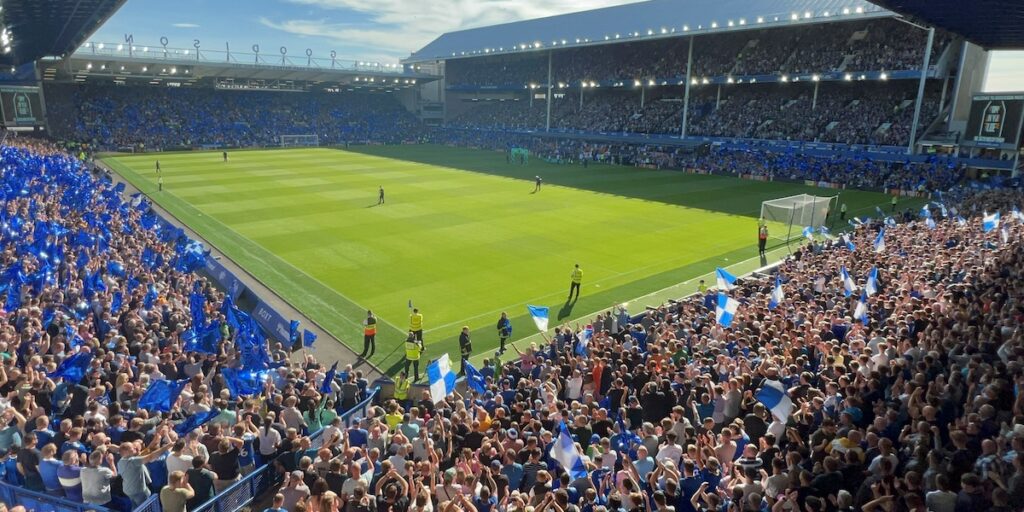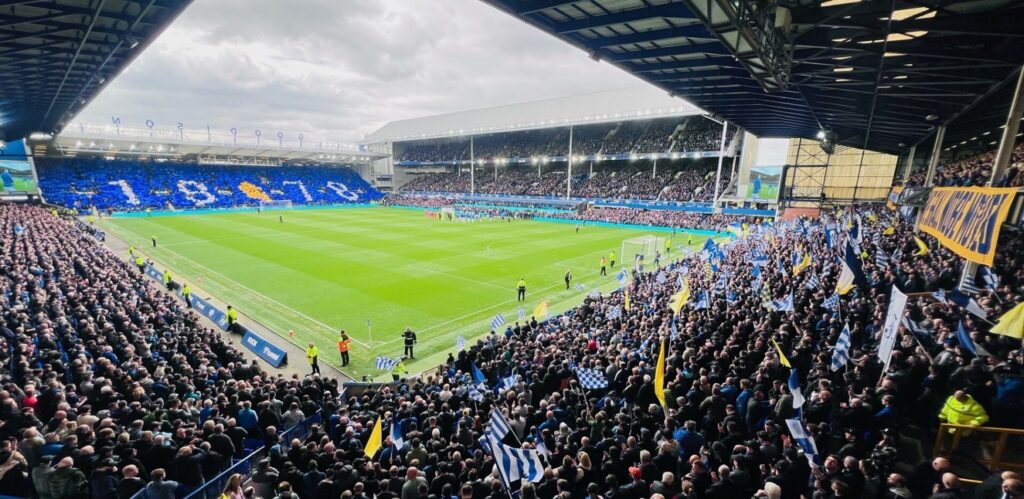TheStadiumBusiness.com caught up with Dipesh Patel, principal and head of sport at international design practice BDP Pattern, to discuss the importance of venue legacy, emerging trends in the sector, and Everton’s new stadium.
Following the acquisition last year by international design practice BDP and the recent opening of its first studio in the US, these are exciting times for Pattern.
The global stadia design specialist, which was founded by Patel in 2010, was bought by BDP in July 2021 and the combined company now operates as BDP Pattern. Earlier this month, the practice began actively operating in the US with the opening of a New York City studio.
Pattern’s portfolio of high-profile sports and entertainment projects includes a new 52,888-capacity stadium for Premier League club Everton, as well as two venues that will be used at this year’s FIFA World Cup in Qatar – Education City Stadium and Ahmad Bin Ali Stadium, popularly known as Al-Rayyan Stadium.
Founded by Patel as a progressive studio working only in 3D with an emphasis on “parametric, mathematical design and digital fabrication”, Pattern won its first five tenders. The Pattern-designed Hazza Bin Zayed Stadium in Abu Dhabi received plaudits for its sustainability features and, as Patel states, is still regarded as a “ground-breaking” approach to stadium design.
Projects in Qatar, Canada, China and the UK followed for Pattern and last year’s acquisition by BDP marked the logical next step, according to Patel, who studied architecture at Bath University before spending 17 years at Arup Associates.

“Pattern’s portfolio and projects have attracted several major companies over the years,” Patel tells TheStadiumBusiness.com. “However, in our early years, we had not even considered mergers or acquisitions. By 2019, we had delivered many significant projects and wanted to have a greater global reach – all our competitors were much larger than us and had a significant global footprint.
“For a medium-sized firm, delivering projects in multiple countries simultaneously is very difficult. We were in talks with a major global consultancy, but I was nervous about the cultural fit. However, a chance meeting at a conference in South America with a BDP principal started a conversation about a merger.
“I found BDP to be an open-minded, thoughtful firm that cared about its people as much as about design. For me, Pattern was about a culture and way of working and that had to be maintained.”
“With BDP, we have been able to do this and we now have the huge benefits of a global footprint that will enable us to deliver major sports projects around the world.”
Legacy
Matches at this year’s World Cup in Qatar will take place across eight stadiums – seven of which have been built from scratch. Such a strategy inevitably raises questions about their use after the tournament and the risk of ‘white elephant’ venues, but Pattern’s two World Cup stadiums have been built with legacy in mind.
Both Education City Stadium and Al-Rayyan Stadium have uses that were in place prior to Qatar landing the World Cup. Al Rayyan SC played at the old ground which was demolished to make way for the new 44,000-seat stadium, while Education City Stadium will seek to serve as a resource for on-campus students.

All major events claim a great legacy idea, but very few are successful.
“The 2000 Olympic stadium in Sydney is going to be demolished, Brazil has many unused and decaying venues and even our own Olympic stadium (in London) has taken a huge amount of money to create a compromised football venue.
“In Qatar, we were designing to a brief. For Education City, we had the benefit of a major educational campus with the stadium as a central resource. This project was planned before Qatar secured the 2022 World Cup and was adapted to host World Cup matches.
“At Ahmad Bin Ali stadium, we had the benefit of an established club with a stadium being rebuilt on the same site. From the outset, the focus was on legacy, both from the perspective of Al Rayyan SC and the local community. The site was, and is, much more than a stadium, it is a sports park for many sports and social events.
“Our masterplan focused on creating a community facility that suited the local culture of evening gatherings, walks and exercise. The Al Rayyan precinct was designed as a place for the community in the first instance and then ‘overlayed’ to ensure a World Cup match could be accommodated, without compromise.”
Patel notes that both Education City Stadium and Al-Rayyan Stadium are broadly 50% permanent and 50% modular seating, allowing their capacities to be reduced for their legacy use, driving demand and generating an “engaging atmosphere”. Modular seating that will be removed post-World Cup could either be used at football venues in other countries or in community facilities in Qatar.
Patel hopes the stadiums can leave a similar legacy as the aforementioned Hazza Bin Zayed Stadium in Abu Dhabi – his “proudest achievement” – by attracting capacity crowds in the long run.

Urban regeneration
Away from Qatar, Pattern’s biggest ongoing project is Everton’s new waterfront stadium at Bramley-Moore Dock.
Everton broke ground on the £500m (€572m/$572m) project in August 2021 and the stadium is due to be completed in time for the 2024-25 season.
Patel cited the waterfront location as one of the main challenges with the project as it creates issues around climate and single-aspect entry. These challenges have been overcome with “detailed computer models” to stimulate the conditions and generate the solutions now employed in the design.
“What excites me most about Everton Stadium is urban regeneration,” he says. “This part of Liverpool has been in decay for decades. The very fine docks and surrounding warehouses are largely unused and closed to the public.
“It reminds me very much of when I first went to Eastlands in Manchester in 1998 when we (Arup) started the City of Manchester Stadium (now the Etihad Stadium). The area was one of the most disadvantaged in Europe with major social and infrastructure challenges. Today it is a thriving new part of Manchester with continuous development since the stadium was completed in 2002 for the Commonwealth Games.
“The area that surrounds Bramley-Moore Dock is almost identical, with the key difference that it is a much more prominent part of the city.”
I hope and believe that the ripple effect of Everton’s new home in that location will be transformational to the waterfront and city as a whole.
“It is estimated by CBRE that the Everton stadium and associated development in North Liverpool will generate a £1.3bn boost to the economy, create tens of thousands of jobs and attract 1.4 million visitors to the city. The stadium is not just a football ground; it is a once-in-a-generation project that will act as a catalyst for £650m of accelerated regeneration.”

Sustainability
Patel explains that all of BDP Pattern’s projects begin with an aim to “maximise passive benefit”.
Depending on location, the firm looks to balance the requirements of spectators with the health of the field or pitch. For example, in hot climates the roof and facades focus on passive cooling and shade, while in cold climates wind protection and rain cover drive the passive design strategies.
“The major resources for a stadium are water and power,” says Patel. “The large roof areas are suited to power generation and, combined with battery storage, very well aligned to the periodic peak demand.
“At Everton Stadium we have no generators, only a large battery bank fed by rooftop photovoltaic panels. Across most of our projects aerodynamic control is critical from passive cooling, minimising wind chill and good grass growth conditions.
“Established water-saving measures are now common and water harvesting is standard, but we are also researching larger-scale concepts to recycle water on site and improve water collection. Social sustainability is an often-overlooked metric. As major community assets that drive social cohesion and community spirit, stadia can play a major role in building social capital and community pride.”
BDP Pattern has a research programme in place to develop demountable and re-use solutions that avoid excessive expenditure and waste. The company is keen to open up world events to less-wealthy countries and improve sustainability.
“Most major event authorities are now encouraging repurposing, re-use and modular. At BDP, we strongly support this much more sustainable and cost-effective approach, both to minimise environmental impact and to enable less-wealthy nations to benefit from hosting major sporting events.”
Emerging trends
Looking ahead, Patel is noticing a “clear upscaling” of facilities and describes the general admission offer as “greatly enhanced” from a few decades ago.
Patel cites greater food and beverage offerings, pay-as-you-go dining and higher-quality concourses as emerging trends in the stadium sector, and these are set to be implemented across BDP Pattern’s ongoing projects.
“In hospitality, there seems to be a trend away from boxes (suites) towards lounges,” he says. “This offer is being stratified with a variety of options, from loge boxes to high-end dining. At our Everton project, we are going as far as introducing ‘show kitchens’ with celebrity chefs.
“Technology is a major drive for change, bringing in greater fan engagement, better data collection, at-seat service and digital event involvement. Most events are now becoming a day out with significant pre- and post-match entertainment including music, lectures and gaming.”
In masterplan contexts, stadiums now offer a larger mix of facilities including retail, hotel and residential. One of our recent projects had a shopping mall embedded into the stadium. This variety helps revenue and daily footfall.
Although the past 12 months have seen the reopening of facilities around the world following COVID-19, Patel recognises that the pandemic has had a “profound” impact on eventgoers, with social habits having changed and the current cost-of-living crisis affecting fans’ spending capacity.
“With disposable income being strained, we are working to ensure venues support organisations so their attendance at sport and entertainment events remains strong,” says Patel.
“We understand that these events build social cohesion and provide relief from the challenges of daily life. Looking toward the future, we understand the importance of team sport and know it has a huge social benefit which needs to be supported and funded for the long-term benefit of all our communities.”





